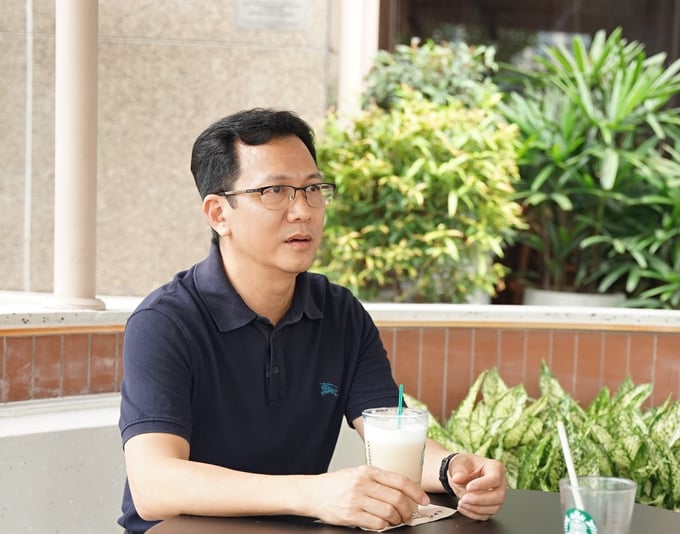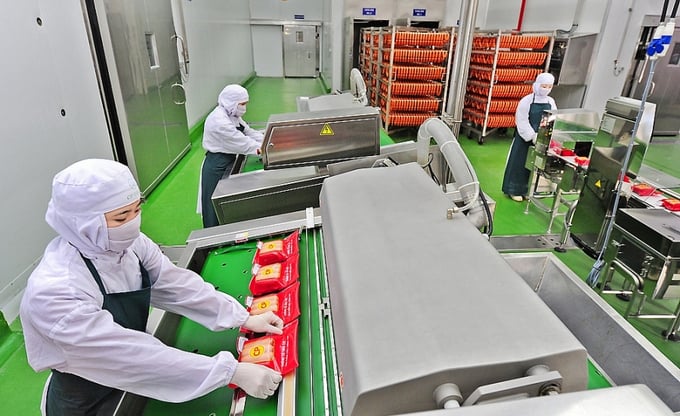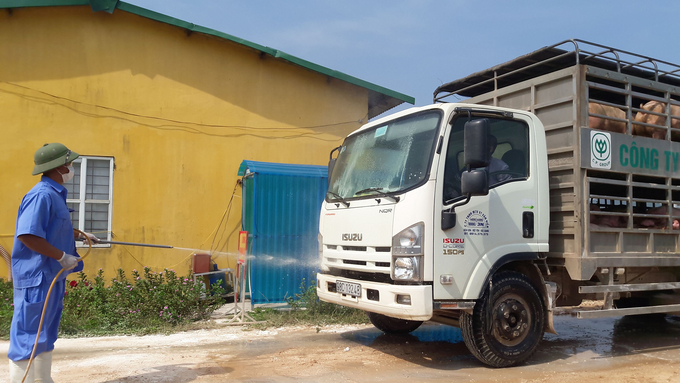June 3, 2025 | 15:49 GMT +7
June 3, 2025 | 15:49 GMT +7
Hotline: 0913.378.918
June 3, 2025 | 15:49 GMT +7
Hotline: 0913.378.918

Mr. Vu Anh Tuan, Senior Vice President of C.P. Vietnam Livestock Joint Stock Company shares the story of human resource training in the agricultural sector. Photo: Linh Linh.
Vietnam Agriculture Newspaper ('VAN') had an interview with Mr. Vu Anh Tuan, Senior Deputy General Director of C.P. Vietnam Livestock Joint Stock Company, which revolves around the story of human resource training for the agricultural industry in the current context of A.I. and 4.0 technology application.
Sir, educational institutions provide tens or even hundreds of thousands of human resources annually for the agricultural sector. Still, I always see enterprises in the farming sector complaining of great difficulties in their work recruitment. Does the C.P. Vietnam side have a similar story?
Breaking away from agriculture is happening in Vietnam and becoming a common trend worldwide. The agricultural industry is transforming to catch up with modern trends, integrating multi-values with the requirements of technological innovation, sustainable practices, increasing productivity, reducing costs, and increasing product value.
Since then, training in human resources of the agricultural industry today requires not only in-depth knowledge of primary fields such as veterinary medicine, animal husbandry, cultivation, and plant protection but also knowledge and general skills to keep up with reality.
C.P. Vietnam Livestock Joint Stock Company currently has about 33,000 employees, of which 18,000 are workers. The rest are officers and professional staff. Professionals are recruited from many industries and degrees from universities, colleges, and intermediate schools, of which about 6,000 people are trained in the agricultural sector such as livestock engineers, veterinarians, livestock engineers, aquaculture, and other occupations in agriculture.
Every year, C.P. Vietnam Livestock Joint Stock Company employs approximately 600-700 students with intermediate to university degrees in agriculture, including the number of additional recruitments for business expansion or to replace the number of people leaving and retiring accounts for about 10%.
Looking at the current situation, recruiting labor for the agricultural sector faces quality and quantity difficulties. The company needs to recruit quality personnel and ensure the annual number of people to serve the job needs.
Over the years, the recruiting department of C.P. Vietnam also actively seeks and introduces jobs to workers. Still, recruitment is relatively tricky, the number is relatively small, and sometimes it must accept the recruitment of personnel who both work and receive professional training at training centers and practice at livestock establishments until personnel is standardized and reach the desired level..

C.P. Vietnam Livestock Joint Stock Company has about 33,000 employees, including 18,000 workers, the rest are officers and professional staff. Photo: N.H.
Sir, from the recruitment experience of C.P Vietnam Livestock Joint Stock Company. How do you see the quality of human resources and school training today?
I can use an example to illustrate this story. Foreign enterprises in animal husbandry or veterinary medicine must recruit and train employees in a specialized direction. Veterinarians who specialize in swine may be very skilled in their expertise regarding pigs but are unlikely and do not need to know much about veterinary medicine or raising poultry such as chickens, ducks or buffaloes, and cows and vice versa.
poultry breeder will have someone good at meat-oriented chickens who are good at egg-oriented chickens. From there, the trend of training cadres and workers abroad is often narrow and deep.
I think intensive training is quite essential, as in Thailand, students of veterinary medicine and animal husbandry can learn the same basic knowledge in the first 1-2 years, but from the 3rd year onwards, students need must follow the specialization, in-depth as well as follow the teachers and teachers to approach the profession early so as not to be surprised after graduation or graduation.
In Vietnam today, most institutions are training in a comprehensive general direction, everything is learned, but it is infrequent to get a deep understanding of the roots, except I find a teacher to learn by myself.
For C.P. Vietnam Livestock Joint Stock Company, the training will depend on the department and field in charge. As staff specializing in pig farming techniques, we usually must retrain at least eight months as quickly as possible.
But it takes 1.5 years to work independently because after school, the theory class will have to go through practice, apprentice at the company's training centers, and internship on farms with the tutoring and guidance of management levels. However, other departments such as sales and marketing staff of the company only need to train at training centers and farms for about 5-6 months to practice and get used.
Indeed, suppose schools and businesses cooperate well, closely, and effectively in this joint training work. From the last few years, they can practice what they have learned so that after graduating from school, being able to start working will save a lot of time, effort, and money for more training like today.

Talking to a reporter for VAN, Mr. Vu Anh Tuan said that in fields such as animal husbandry and veterinary medicine, if they equip themselves with expertise and experience, they will have high stability because the staff in the industry is in short supply. Photo: Linh Linh.
Thus, the effort of agricultural enterprises to retrain personnel to meet the job is quite arduous. Human resource training is already challenging; it is even more difficult for employees to stick with the business. How do you think about the love and passion for the agricultural industry of today's youth?
In recent times, our company has had a tough time recruiting. But when recruiting, through training and a practical approach, most of them have experience with the profession, understand more about it, and love it very much.
Most people were attached to C.P. Vietnam, or some wanted to go out and do their jobs. After graduating from agricultural schools, I noticed that many children do not work in agriculture but switch to other professions.
In my opinion, educational institutions need to change their training methods so that students can approach businesses and their careers sooner, and then step by step, day by day pay more attention to their work, understand more about work, and gradually arouse their love of work so that when they graduate from school, they will choose the job they were trained for instead of going to another profession.
Like other professions, nowadays, even though they study animal husbandry and veterinary medicine, young people who graduate from school tend to like to work in sales (selling bran, supplementary food for livestock or drugs and vaccines in animals) to make a lot of money immediately instead of choosing technical, specialized jobs and sticking to the barn. How do you evaluate this trend?
This problem may have been confirmed in previous years, but the current trend is that children prefer to do engineering on farms.
This change can come from two reasons; firstly, students with technical training want to practice and work on farms to have the opportunity to equip themselves with professional knowledge. After accumulating good professional experience, they can do well in sales.
The second reason is that nowadays most families often have few children, economic conditions are also better, so parents often expect their children to work in an environment of moderate pressure and move less but here are two factors that do not exist in the sales industry.

According to the leader of C.P. Vietnam Livestock Joint Stock Company, the agricultural industry, in general, and especially the animal husbandry and veterinary sectors, needs to be trained in a specialized direction. Photo: N.H.
In the context of the application of Industry 4.0, artificial intelligence A.I., how do you evaluate the competition for income and the life of personnel in the agricultural sector compared to other industries?
As in previous years, the income in the agriculture or livestock industry is even better than in other sectors.
For fields such as animal husbandry and veterinary medicine, if they equip themselves with expertise and experience, they will have high stability because of the shortage of human resources in the industry. In this industry, the position and salary will also increase year by year according to the qualifications and experience of the students.
C.P. Vietnam Livestock Joint Stock Company has positions related to livestock engineering, veterinary medicine, doctors, livestock engineers, and aquaculture engineers. If they stick with it for a long time, have good qualifications, experience, and a high salary, they can get up to VND several tens of million/month or more.
Thank you, Sir!
"The biggest advantage of the agricultural industry compared to other occupations is that the more senior the employees, the longer they work, the more they are valued and paid by businesses because of the demand for expertise, experience, and management. The school should share the stories widely so that the student can understand, fall in love and be passionate about their chosen profession," said Mr. Vu Anh Tuan.
Translated by Tu Quyen

(VAN) TTC AgriS and IFC signed a strategic partnership to develop a sustainable agricultural value chain, aiming to achieve the Net Zero target by 2035.

(VAN) Seafood by-products are opening a new path, combining green growth and technological innovation to enhance the industry's value.

(VAN) Mr. Nguyen Thanh Cong, Vice Chairman of the Son La Provincial People's Committee, reflects on Son La’s journey from barren hills to fruitful orchards after a decade of hard work.

(VAN) FAO’s Director-General addresses the 5th Baghdad International Water Conference.
/2025/05/26/1716-4-nongnghiep-191706.jpg)
(VAN) Chain linkages, technological innovation, and raw material zoning are three strategic pillars for the coconut industry to strongly develop and elevate its position on the global agricultural map.
![Advanced mariculture – an inevitable trend: [4] Accompanied by scientists](https://t.ex-cdn.com/nongnghiepmoitruong.vn/608w/files/sohk/2025/05/13/1941-pgsts-vo-van-nha-140958_717.jpg)
(VAN) According to Assoc. Prof. Dr. Vo Van Nha, Director of the RIA III, the development of advanced offshore mariculture is no longer an option but an essential path for Vietnam’s fisheries sector.

(VAN) Vietnam is intensifying the development of mollusk farming areas that meet international standards, aiming for sustainable growth and enhancing its export position in the global seafood market.